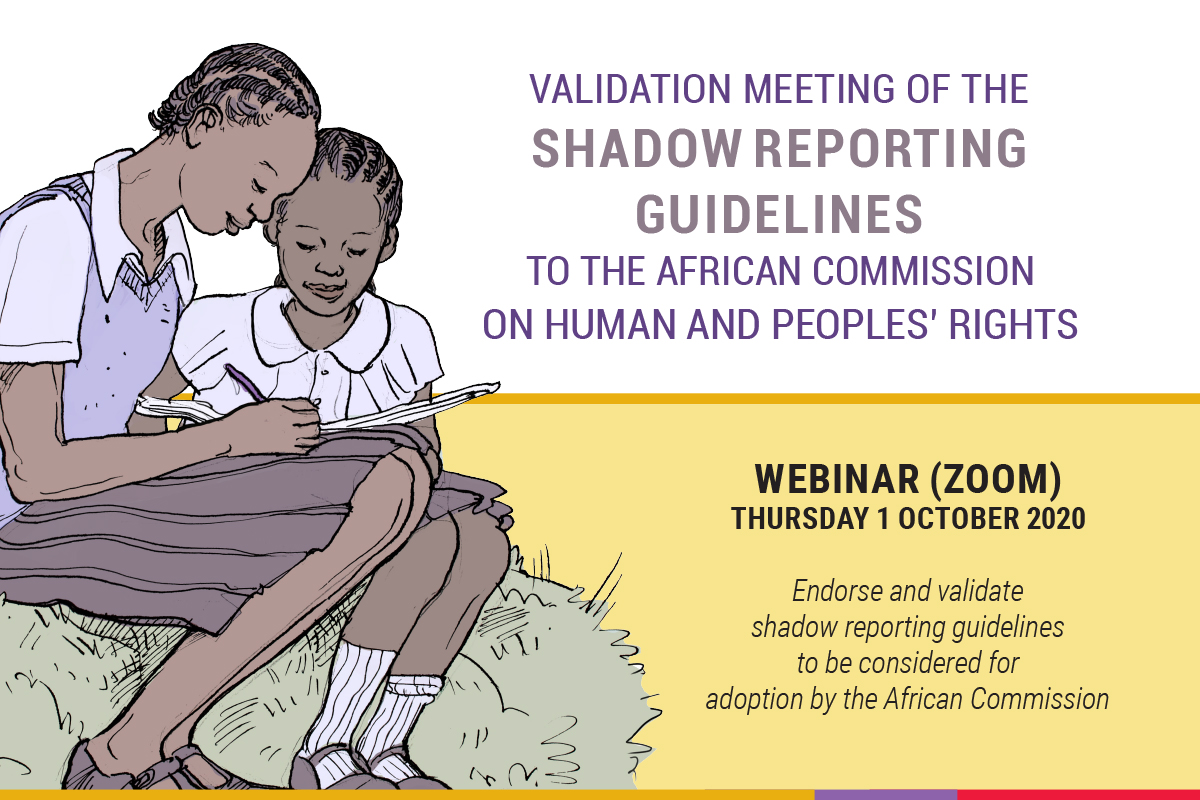The Centre for Human Rights, Faculty of Law, University of Pretoria, in partnership with the International Commission of Jurists (ICJ Kenya) and Equality Now cordially invite you to a validation meeting of the shadow reporting guidelines to the African Commission on Human and Peoples’ Rights.
Webinar
Thursday 1 October 2020
Webinar (Zoom)
09:00 GMT / 10:00 WAT / 11:00 SAST / 12:00 EAT
Theme: Validation meeting of the shadow reporting guidelines to the African Commission on Human and Peoples’ Rights
Moderator: Susan Mutambasere
Centre for Human Rights, University of Pretoria
Programme
- Welcome remarks
Prof Frans Viljoen, Director, Centre for Human Rights, UP - Introductory Remarks
Equality Now - Introduction to the State Reporting Mechanism and Shadow Reporting
Patience Mungwari, Centre for Human Rights, UP - General overview of the Shadow Reporting Guidelines
Dr Satang Nabaneh, Centre for Human Rights, UP - Breakaway groups:Discussion of specific sections of the Shadow Reporting Guidelines
All participants - Presentation of group comments and discussion
Joanne Mutonga, ICJ Kenya - Closing remarks
Mr Abdul Noormohammed, Executive Director, ICJ Kenya
Purpose of the webinar
The African Commission on Human and Peoples’ Rights at its 27th Extraordinary Session held in Banjul, The Gambia from 19 February to 4 March 2020 adopted Resolution 436 on the need to develop guidelines for shadow reporting. The resolution recognises the role that civil society organisations and National Human Rights Institutions play in providing information to the African Commission in their consideration of reports submitted by Member States. It also notes that there are currently no guidelines for the drafting of these shadow reports. In light of that, the Centre for Human Rights, University of Pretoria, the International Commission of Jurists (ICJ Kenya) and Equality Now (hereafter referred to as partners) have developed draft guidelines on shadow reporting to the African Charter on Human and Peoples’ Rights (African Charter) and the Protocol on the Rights of Women in Africa (Maputo Protocol).
The guidelines were developed to assist civil society organisations and National Human Rights Institutions to develop shadow reports on the African Charter and the Maputo Protocol. The guidelines will also empower its users to effectively utilise shadow reports as an advocacy tool in pursuit of accountability and redress for injustices and inequalities. As States submit their reports in line with their treaty obligations, civil society organisations have a greater role to play in ensuring effective and constructive engagement between States and the African human rights system through developing shadow reports.
The webinar aims to emphasise the purpose of state reporting as well as shadow reporting. It will introduce the draft guidelines and invite comments from broader civil society organisations across the continent in order to ensure that its contents are reflective of their needs. It is the partners’ hope that the participants will endorse and validate the guidelines, and that the guidelines will be considered for adoption by the African Commission.
For more information, please contact:


